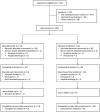"Song of Life": Results of a multicenter randomized trial on the effects of biographical music therapy in palliative care
- PMID: 33876660
- PMCID: PMC8188998
- DOI: 10.1177/02692163211010394
"Song of Life": Results of a multicenter randomized trial on the effects of biographical music therapy in palliative care
Abstract
Background: Awareness for the importance of psychological and spiritual needs in patients with terminal diseases has increased in recent years, but randomized trials on the effects of psychosocial interventions are still rare.
Aim: To investigate the efficacy of the "Song of Life" music therapy intervention regarding the emotional and psycho-spiritual dimensions of quality of life.
Design: Patients were randomly assigned to either "Song of Life" or a relaxation intervention. "Song of Life" is a novel three-session music therapy intervention working with a biographically meaningful song. Primary outcome was the improvement in psychological quality of life. Secondary outcomes included spiritual well-being, ego-integrity, momentary distress, and global quality of life and the explorative assessment of treatment satisfaction (patient and family member version). Intention-to-treat analysis was conducted including adjustment for multiple testing in secondary outcomes.
Setting/participants: Between December 2018 and August 2020, 104 patients receiving specialized palliative care were recruited from two palliative care wards.
Results: No significant differences were found regarding psychological and global quality of life, but "Song of Life" participants reported significantly higher spiritual well-being (p = 0.04) and ego-integrity (p < 0.01), as well as lower distress (p = 0.05) than patients in the control group. Both patients' and family members' treatment satisfaction was higher after "Song of Life" with large between-group effect sizes on items asking for meaningfulness (d = 0.96) and importance (d = 1.00).
Conclusions: Our findings provide evidence that "Song of Life" is an effective and meaningful biographical music therapy intervention to facilitate psycho-spiritual integration in terminally ill patients.
Trial registration: German Clinical Trials Register (DRKS)-DRKS00015308 (date of registration: September 7th 2018).
Keywords: Music therapy; cancer; distress; ego-integrity; end-of-life; palliative care; quality of life; randomized controlled trial; spiritual well-being.
Conflict of interest statement
Figures



References
-
- Holland JC, Breitbart WS, Jacobsen PB, et al.. Psycho-oncology. New York: Oxford University Press, 2010.
-
- Potter J, Hami F, Bryan T, et al.. Symptoms in 400 patients referred to palliative care services: prevalence and patterns. Palliat Med 2003; 17: 310–314. - PubMed
-
- World Health Organization. WHO definition of palliative care; http://www.who.int/cancer/palliative/definition/en (2015, accessed 30 April 2015).
-
- Mitchell AJ, Chan M, Bhatti H, et al.. Prevalence of depression, anxiety, and adjustment disorder in oncological, haematological, and palliative-care settings: a meta-analysis of 94 interview-based studies. Lancet Oncol 2011; 12: 160–174. - PubMed
-
- Rodin G. Research on psychological and social factors in palliative care: an invited commentary. Palliat Med 2013; 27: 925–931. - PubMed
Publication types
MeSH terms
Associated data
LinkOut - more resources
Full Text Sources
Other Literature Sources

